How to Play MP3 in Windows Media Player [Errors and Fixes]
MP3 is one of the most widely used audio formats in the world, and Windows Media Player has long been the default player for millions of PC users. So, it can be frustrating when something as simple as playing an MP3 file doesn't work as expected. In this guide, we'll explore how to play MP3s in WMP, the possible reasons why MP3 files may fail to play in Windows Media Player, and provide actionable fixes.
Part 1: How to Play MP3 Files in Windows Media Player
1. Direct Playback MP3 in Windows Media Player
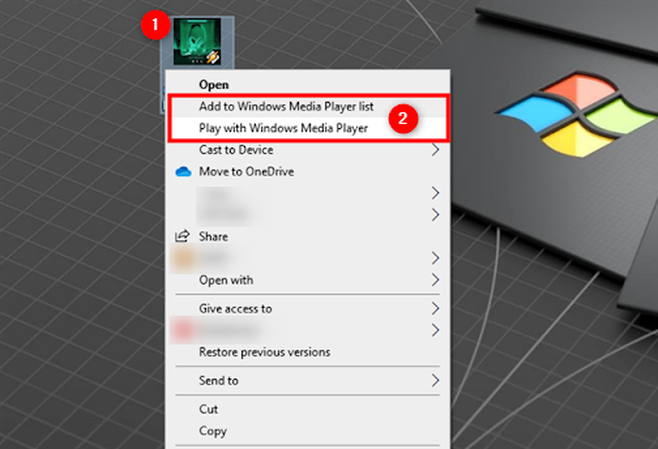
Windows Media Player is designed to handle MP3 files effortlessly-in theory. Playing MP3 files in WMP is straightforward-if your system is up-to-date. Here's how:
- Step 1:Locate your MP3 file in File Explorer.
- Step 2:Right-click the file and select "Open with" > "Windows Media Player".
- Step 3:If WMP doesn't appear, set it as the default player: Go to Settings > Apps > Default apps.
Under "Music player", select Windows Media Player.
Pro Tip: For older Windows versions (e.g., Windows 7), ensure you have installed the latest WMP updates via Windows Update.
2. Organize Your Library for Effortless Playback
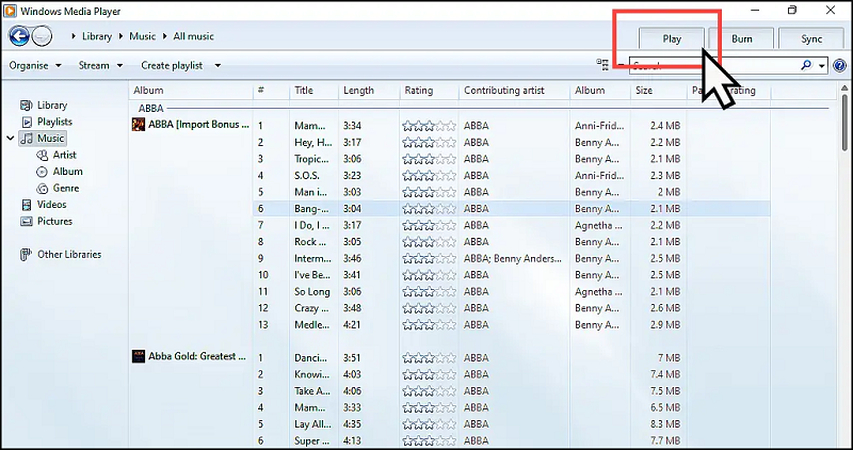
Managing a large music library in WMP can feel like herding cats if your files are scattered across folders. WMP's library feature solves this by centralizing your MP3 collection. To add folders:
- Step 1:Open WMP and click "Organize" > "Manage libraries" > "Music".
- Step 2:Click "Add" and select the folder containing your MP3 files.
- Step 3:WMP will auto-scan and display all tracks in the library.
Note: If files are missing, check if they are in a supported format. For non-MP3 files (e.g., FLAC), skip to Part 3 for conversion tips.
Part 2: Why Windows Media Player Fails to Play MP3 Files
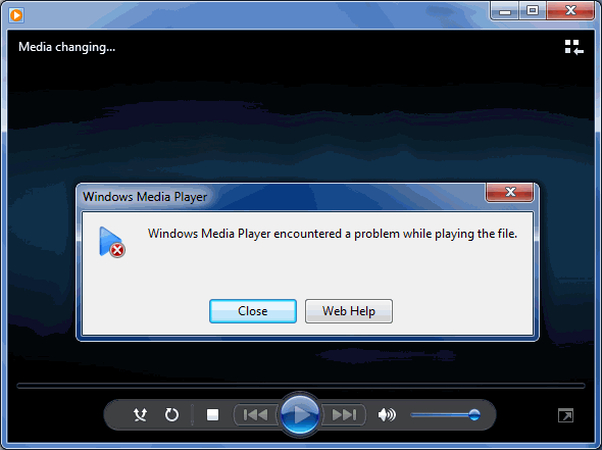
1. Corrupted or Partially Downloaded MP3 File
If the MP3 file was not fully downloaded or is damaged, Windows Media Player may not be able to open it at all. In some cases, you'll see an error message like:
"Windows Media Player cannot play the file. The file may be corrupted or in a format that the Player does not support."
2. Unsupported MP3 Encoding
While MP3 is a standard format, not all MP3s are created equal. Some files may use uncommon bitrates or variable bitrates that Windows Media Player struggles to decode-especially on older versions like WMP 11 or WMP 12.
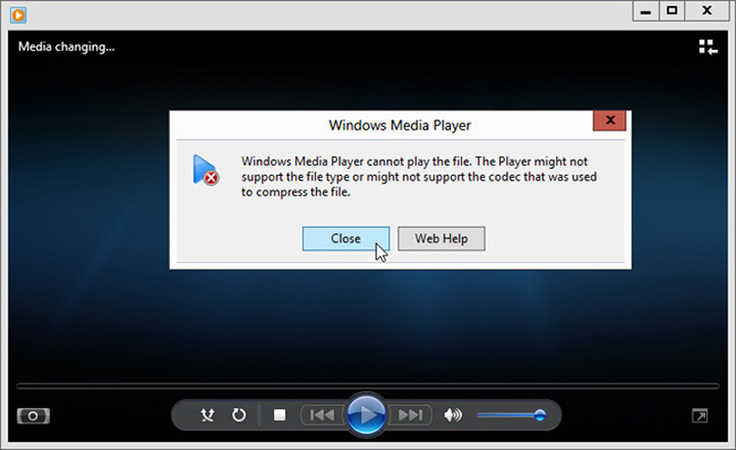
3. Outdated Audio Codecs
Windows Media Player relies on audio codecs to decode and play audio files. If your system is missing a required codec or it's outdated, playback may fail silently or throw errors.
4. Incorrect File Extension
Occasionally, files with a .mp3 extension may not actually be in MP3 format. A renamed .aac or .m4a file may confuse WMP, causing it to crash or simply not respond.
5. Windows Media Player Settings or File Associations
It's also possible that WMP is no longer set as the default player for MP3s, or file associations are broken, leading to playback attempts opening the wrong app or failing altogether.
Part 3: How to Fix MP3 Playback Issues in Windows Media Player
Here are some proven methods to resolve MP3 playback issues and get your files playing smoothly.
1. Verify the File Integrity
Try playing the same MP3 file in another media player like VLC. If it doesn't work there either, the file is likely corrupted. You can redownload the file or recover a working version.
2. Update Windows Media Player and Windows OS
Outdated versions of WMP may lack support for newer encoding standards.
Go to Settings > Update & Security > Windows Update to install the latest patches.
Open Windows Media Player > Help > About to verify your version.
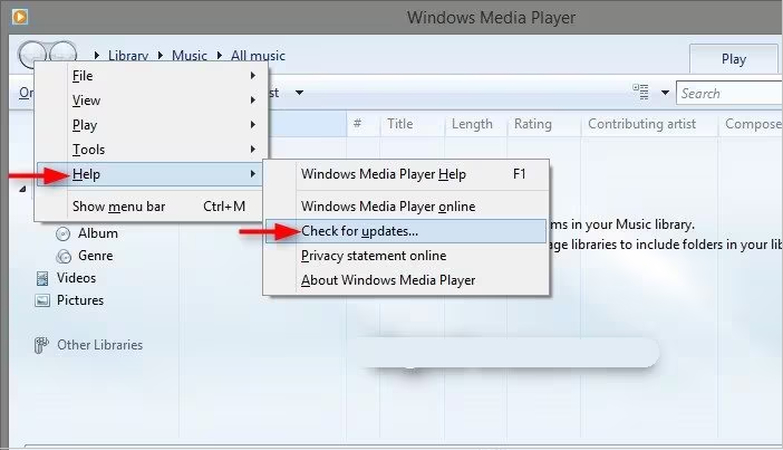
3. Install Missing Codecs
While WMP supports MP3 natively, some MP3 files use enhanced encodings or tags that require extended codec packs. Download the K-Lite Codec Pack or other trusted codec bundles. Then, restart WMP after installation.
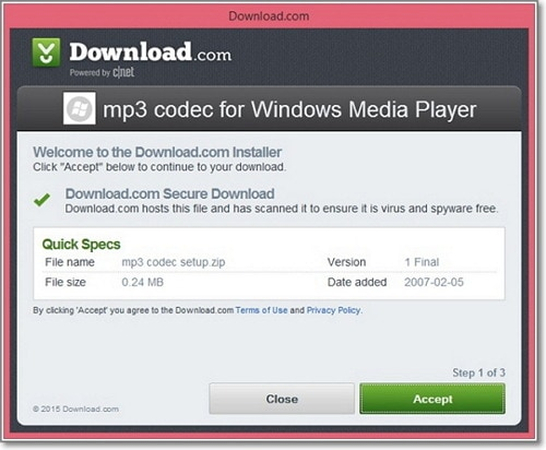
4. Use a Dedicated Media Converter
If the file simply refuses to play, your best option is to convert it into a compatible format or re-encode it properly using a trusted tool like Univd Video Converter.
Part 4: Convert MP3 to WMA to Solve MP3 Playback Problems in WMP
Whether you're facing corrupted files, compatibility issues, or want to batch convert files into universally playable formats, Univd Audio Converter offers a robust and user-friendly solution. You can convert these unsupported MP3 files to other Windows Media Player-supported files like WMA, WAV, MP4, MKV, and more than 1000 formats.

HitPaw Univd - All-in-one Video Solutions for Win & Mac
Secure Verified. 254,145 people have downloaded it.
- Universal Format Conversion: Convert MP3 files to WMA, AAC, WAV, or even lossless FLAC-all with customizable bitrates.
- Batch Conversion: Drag-and-drop hundreds of files at once and convert them in bulk without losing quality.
- Preset Device Profiles: Convert audio for playback on specific devices like iPhones, Androids, smart TVs, or car systems.
- Built-in Audio Editor: Trim, merge, or adjust volume of your MP3 files before converting.
- High-Speed Processing: Powered by GPU acceleration, Univd processes files up to 50x faster than standard tools.
Secure Verified. 254,145 people have downloaded it.
How to Convert MP3 to WMA Files with Univd
Converting MP3 to a compatible or optimized format with Univd is simple, even for beginners. Here's how:
Step 1: Launch the Program and Add Files
Install HitPaw Univd and launch it. Click the "Add Files" button or drag your MP3 files directly into the converter.
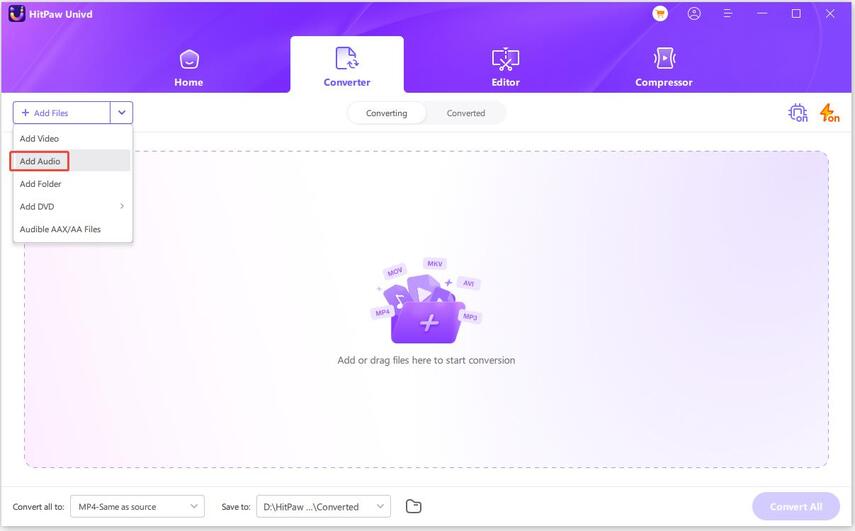
Step 2: Choose Output Format
Select a compatible format for Windows Media Player, such as: MP3 (standard bitrate), WMA (Windows-native), WAV (lossless).
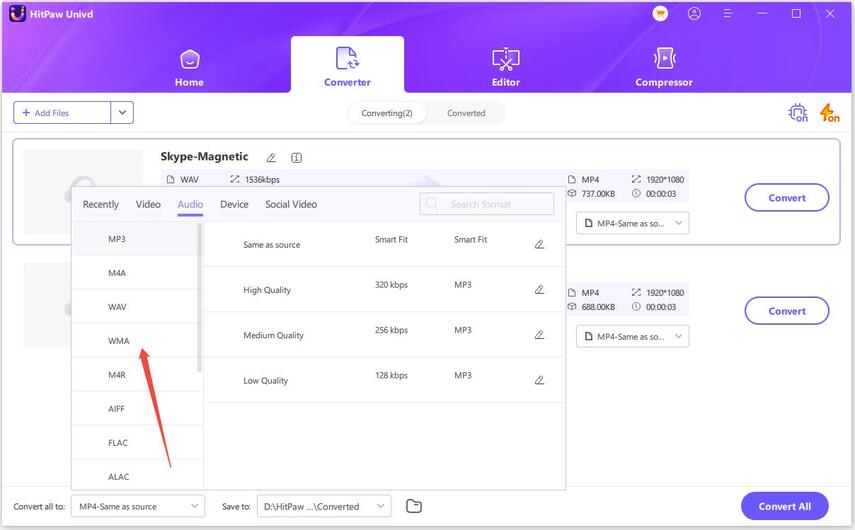
Step 3: Adjust Advanced Settings (Optional)
Click the settings icon to change bitrate (e.g., 128kbps, 256kbps, 320kbps) and audio encoder.
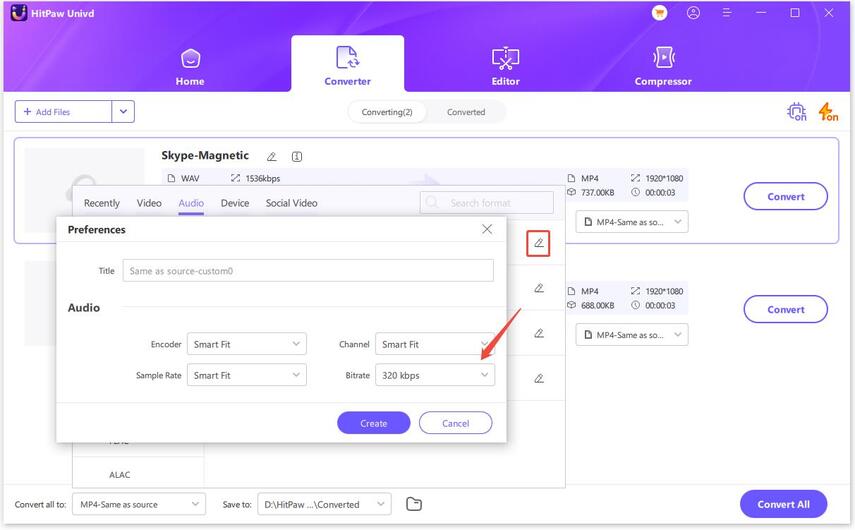
Step 4: Convert MP3 to WMA Format
Choose the destination folder and hit the Convert button. In seconds, you will have a fully compatible file ready for playback.
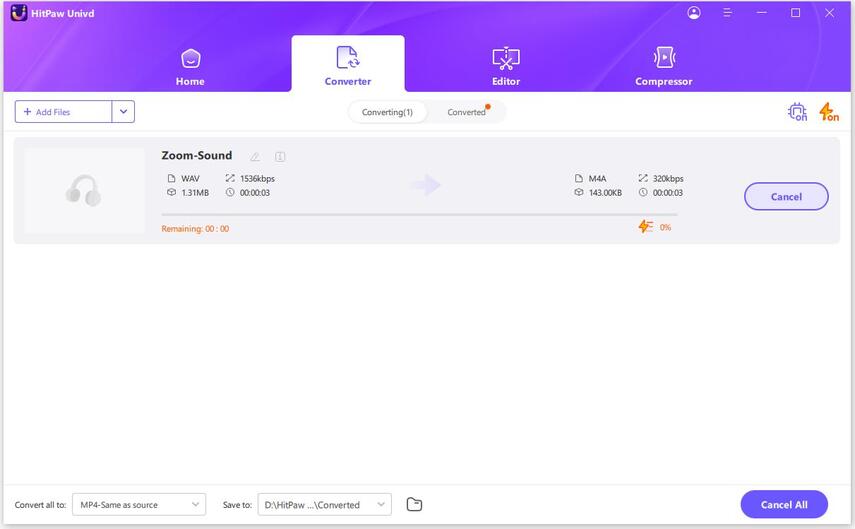
FAQs about Windows Media Player Play MP3 Files
Q1. Why does my MP3 file play in VLC but not in Windows Media Player?
A1. VLC supports a broader range of codecs out-of-the-box, including some MP3 variants that Windows Media Player does not. This suggests that your MP3 file may be encoded with an unusual bit rate, header, or tag structure. In such cases, converting it to a standard MP3 or WMA file using Univd Video Converter will resolve the issue.
Q2. Can Univd convert other media formats too, like MP4, MKV, or MOV?
A2. Definitely. Univd is a full multimedia converter, capable of converting video formats like MP4, MOV, AVI, MKV, WebM, and many others. It's not just for audio-it's an all-in-one platform for all your conversion needs.
Q3. Why can't I play MP3 files on Windows Media Player?
A3.
Here are 6 possible reasons why you can't play MP3 files in Windows Media Player:
Conclusion
When MP3 files won't play in Windows Media Player, the cause could be as simple as a codec issue, or as complex as file corruption or encoding anomalies. Instead of spending hours tweaking settings or downloading sketchy codec packs, take control with Univd Video Converter. It helps that every MP3 file plays exactly how and where it should, whether in Windows Media Player or any other device. Try Univd Video Converter today and make your media files work for you, not against you.








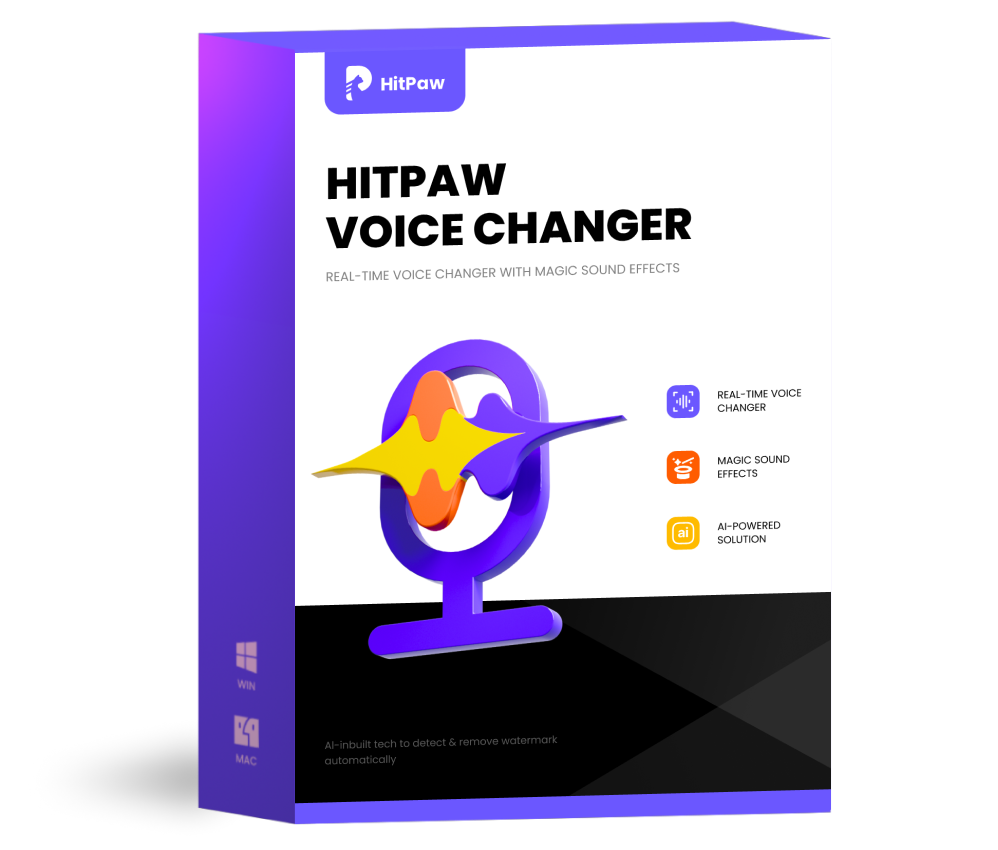 HitPaw VoicePea
HitPaw VoicePea  HitPaw VikPea (Video Enhancer)
HitPaw VikPea (Video Enhancer)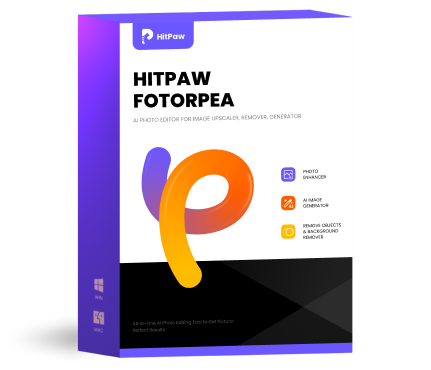 HitPaw FotorPea
HitPaw FotorPea

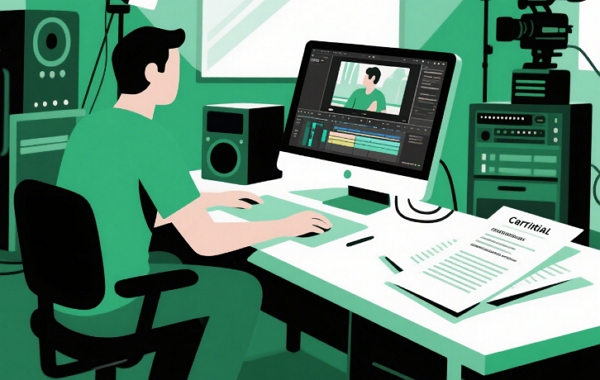

Share this article:
Select the product rating:
Daniel Walker
Editor-in-Chief
This post was written by Editor Daniel Walker whose passion lies in bridging the gap between cutting-edge technology and everyday creativity. The content he created inspires the audience to embrace digital tools confidently.
View all ArticlesLeave a Comment
Create your review for HitPaw articles